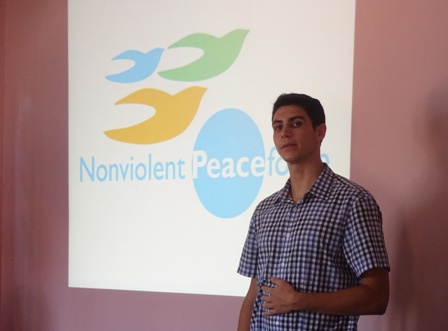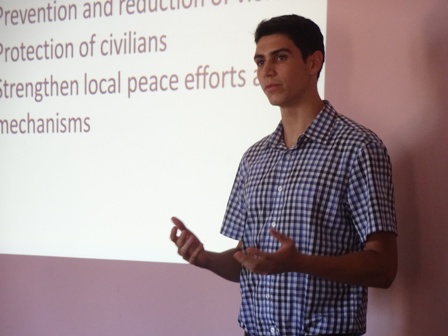Record from a Peacekeeper in Myanmar
By Jasper Peet-Martel
Myanmar Country Office Programs Intern

As an intern for this rapidly growing country program, I have the responsibility to help with a wide range of activities in the office, and at trainings that provide innovative ways to give civilians greater support and protection in zones of conflict. Myanmar presents unique challenges given its incredible diversity of key actors in far-flung regions, and the extensive depth and intricate histories associated with each conflict. Given these challenges, I have had the opportunity to see firsthand just how adaptable and dynamic NP is when addressing civilian protection challenges. NP capitalizes on the unique advantages of working in Myanmar, from the highly organized and engaged civil society groups, to the immense energy for positive change that one feels instantly as they walk into any local NGO office here. Converting realities on the ground into robust civilian protection programs is no easy feat, yet by building on NP’s previous experiences in other countries and sticking to our core principles of unarmed civilian protection, challenges are met and obstacles are overcome.
I recently had the privilege to assist in awareness trainings on civilian ceasefire monitoring in Mon State, which is located in the tropical southeast region of Myanmar. The NP team, together with a small team from our local partner NGO, the Shalom Foundation, traveled south following the coast of the Andaman Sea until the roads became lined with endless rubber tree plantations and we had reached the Mon State capital city of Mawlamyine. In this lush tropical region the majority of people belong to the Mon ethic group, which means they speak the Mon language and primarily follow the Theravada Buddhist religion. The conflict in Mon State, like many of the other ethnic boarder states, has a unique bilateral ceasefire agreement between the two armed actors, the Myanmar Government and the New Mon State Party (NMSP). While the Nationwide Ceasefire Agreement (NCA) is still being negotiated, existing bilateral agreements between many of the different Ethnic Armed Groups (EAGs) and the Myanmar Government provide an important foundation and reference point for the civilian ceasefire monitoring mechanisms we are supporting.
Throughout the two-day training we collaborated with our local partner NGO by giving an update on the peace process, and leading hands-on workshop sessions explaining the basics of civilian ceasefire monitoring. The prospective monitors, many coming from small towns and remote villages in Mon, pointed out some of the benefits of the bilateral ceasefire agreements, and shared civilian protection concerns of their communities. Such direct communication is incredibly powerful and humbling, illustrating to me the meaning and power of core NP principles: the primacy of local actors, civilian to civilian relationship-building, and non-partisanship. These relationships we build are crucial to our work, and it is with trust and a proactive yet patient attitude that we continue to support the establishment of civilian protection capacities here in Myanmar.

